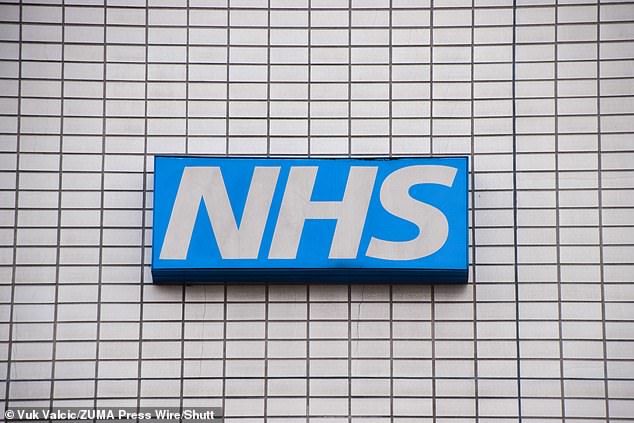Bed blockers are costing the NHS £2.6billion a year with a lack of social care the biggest driver of delays, the first official figures reveal.
For the first time, NHS England has said delays discharging patients who are medically fit to leave cost it around £220million each month.
It put the price of a typical night’s stay at £562, with 390,960 people staying longer than doctors considered necessary in September alone.
This is an average of 13,032 each night, or around one in seven acute hospital beds.
The most common reason patients were delayed was because of difficulties securing ongoing care, such as a place in a care home or support to live independently in their own home.
This accounted for £68million (31 per cent) of the total cost last month.
The analysis does not include wider costs such as the money hospitals lose by not being able to admit other patients for operations or the cost to the bed-blocker themselves of being in an inappropriate setting.
Long hospital stays are associated with increased risk of infections, pressure sores and frailty and residing longer than necessary can hamper recovery.

NHS England says delayed discharges are frustrating for patients and staff
If a similar number of patients are delayed each month throughout the year, as NHS England expects, it would cost the service £2.6billion.
This is higher than the £1.7billion estimated by the King’s Fund think tank in 2023, when it put the nightly cost of a bed at around £395.
Other common reasons for delays include NHS trusts and care providers taking too long to negotiate patients’ onward care packages (30 per cent) and hospitals processes, such as waiting for discharge paperwork to be completed or medicine to be dispensed (20 per cent).
Steve Black, an expert in NHS performance statistics, told the Health Service Journal: ‘Delayed discharges have huge knock-on problems across the system but no one has a way of getting a handle on it.
‘This data provides interesting context on the scale of the problem. It should get some attention – it’s long overdue.’
Cheshire and Merseyside Integrated Care Board had the highest cost of delayed discharges in September, at £18million, after recording 32,730 bed days taken by patients fit to leave – the most in England.
Other high-spending systems on delayed discharges included Greater Manchester ICB (£13million), Hampshire and Isle of Wight ICB (£12million) and West Yorkshire ICB (£11million) – which each lost around 20,000 bed days to the issue in September.
Cost of bed-blocking in each integrated care board ICB Name Average number of bed-blockers per day in September Total number of delayed bed days in September Total cost of delayed bed days in September NHS CAMBRIDGESHIRE AND PETERBOROUGH INTEGRATED CARE BOARD 181 5,430 £3,051,660 NHS NORFOLK AND WAVENEY INTEGRATED CARE BOARD 130 3,900 £2,191,800 NHS SUFFOLK AND NORTH EAST ESSEX INTEGRATED CARE BOARD 136 4,080 £2,292,960 NHS BEDFORDSHIRE, LUTON AND MILTON KEYNES INTEGRATED CARE BOARD 181 5,430 £3,051,660 NHS HERTFORDSHIRE AND WEST ESSEX INTEGRATED CARE BOARD 154 4,620 £2,596,440 NHS MID AND SOUTH ESSEX INTEGRATED CARE BOARD 88 2,640 £1,483,680 NHS NORTH WEST LONDON INTEGRATED CARE BOARD 458 13,740 £7,721,880 NHS NORTH CENTRAL LONDON INTEGRATED CARE BOARD 333 9,990 £5,614,380 NHS NORTH EAST LONDON INTEGRATED CARE BOARD 327 9,810 £5,513,220 NHS SOUTH EAST LONDON INTEGRATED CARE BOARD 350 10,500 £5,901,000 NHS SOUTH WEST LONDON INTEGRATED CARE BOARD 284 8,520 £4,788,240 NHS STAFFORDSHIRE AND STOKE-ON-TRENT INTEGRATED CARE BOARD 142 4,260 £2,394,120 NHS SHROPSHIRE, TELFORD AND WREKIN INTEGRATED CARE BOARD 103 3,090 £1,736,580 NHS DERBY AND DERBYSHIRE INTEGRATED CARE BOARD 218 6,540 £3,675,480 NHS LINCOLNSHIRE INTEGRATED CARE BOARD 165 4,950 £2,781,900 NHS NOTTINGHAM AND NOTTINGHAMSHIRE INTEGRATED CARE BOARD 295 8,850 £4,973,700 NHS LEICESTER, LEICESTERSHIRE AND RUTLAND INTEGRATED CARE BOARD 204 6,120 £3,439,440 NHS BLACK COUNTRY INTEGRATED CARE BOARD 224 6,720 £3,776,640 NHS BIRMINGHAM AND SOLIHULL INTEGRATED CARE BOARD 267 8,010 £4,501,620 NHS COVENTRY AND WARWICKSHIRE INTEGRATED CARE BOARD 235 7,050 £3,962,100 NHS HEREFORDSHIRE AND WORCESTERSHIRE INTEGRATED CARE BOARD 150 4,500 £2,529,000 NHS NORTHAMPTONSHIRE INTEGRATED CARE BOARD 192 5,760 £3,237,120 NHS SOUTH YORKSHIRE INTEGRATED CARE BOARD 517 15,510 £8,716,620 NHS NORTH EAST AND NORTH CUMBRIA INTEGRATED CARE BOARD 583 17,490 £9,829,380 NHS HUMBER AND NORTH YORKSHIRE INTEGRATED CARE BOARD 324 9,720 £5,462,640 NHS WEST YORKSHIRE INTEGRATED CARE BOARD 663 19,890 £11,178,180 NHS GREATER MANCHESTER INTEGRATED CARE BOARD 782 23,460 £13,184,520 NHS CHESHIRE AND MERSEYSIDE INTEGRATED CARE BOARD 1,091 32,730 £18,394,260 NHS LANCASHIRE AND SOUTH CUMBRIA INTEGRATED CARE BOARD 371 11,130 £6,255,060 NHS KENT AND MEDWAY INTEGRATED CARE BOARD 455 13,650 £7,671,300 NHS FRIMLEY INTEGRATED CARE BOARD 190 5,700 £3,203,400 NHS HAMPSHIRE AND ISLE OF WIGHT INTEGRATED CARE BOARD 719 21,570 £12,122,340 NHS BUCKINGHAMSHIRE, OXFORDSHIRE AND BERKSHIRE WEST INTEGRATED CARE BOARD 233 6,990 £3,928,380 NHS SURREY HEARTLANDS INTEGRATED CARE BOARD 197 5,910 £3,321,420 NHS SUSSEX INTEGRATED CARE BOARD 496 14,880 £8,362,560 NHS CORNWALL AND THE ISLES OF SCILLY INTEGRATED CARE BOARD 89 2,670 £1,500,540 NHS DEVON INTEGRATED CARE BOARD 296 8,880 £4,990,560 NHS SOMERSET INTEGRATED CARE BOARD 191 5,730 £3,220,260 NHS BRISTOL, NORTH SOMERSET AND SOUTH GLOUCESTERSHIRE INTEGRATED CARE BOARD 375 11,250 £6,322,500 NHS BATH AND NORTH EAST SOMERSET, SWINDON AND WILTSHIRE INTEGRATED CARE BOARD 273 8,190 £4,602,780 NHS DORSET INTEGRATED CARE BOARD 244 7,320 £4,113,840 NHS GLOUCESTERSHIRE INTEGRATED CARE BOARD 126 3,780 £2,124,360 Source: NHS England
An NHS England spokesperson said: ‘Staying in hospital even though you’re fit to leave is the last thing a patient needs — and it’s frustrating for staff too, who see the strain it puts on capacity and the knock-on effects for others.
‘That’s why the NHS has rolled out care transfer hubs to ensure the most vulnerable patients get the support they need so they’re ready to leave hospital safely and on time.’
Share or comment on this article:
Bed-blockers are costing the NHS £2.6billion a year, the first official figures reveal. So, how bad is the problem in YOUR hospital?
